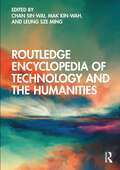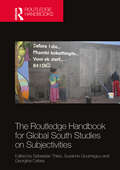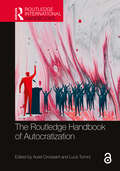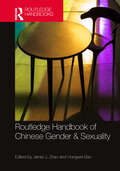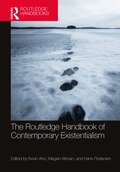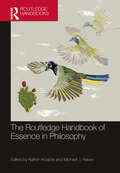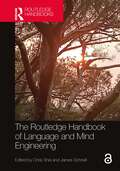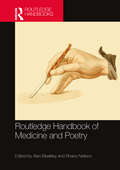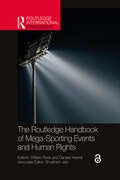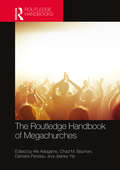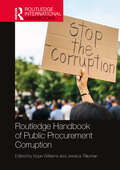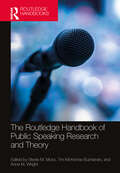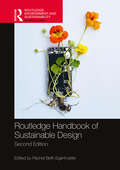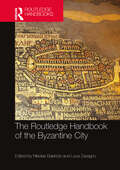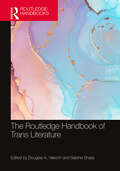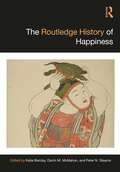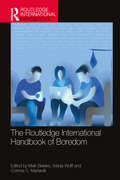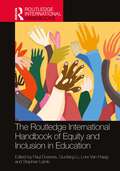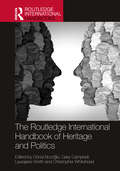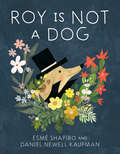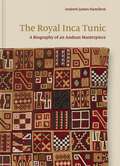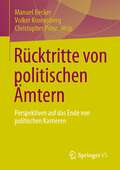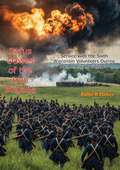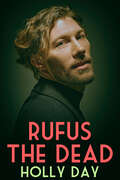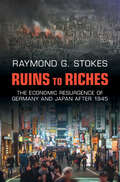- Table View
- List View
Routledge Encyclopedia of Technology and the Humanities
by Chan Sin-Wai Mak Kin-Wah Leung Sze MingRoutledge Encyclopedia of Technology and the Humanities is a pioneer attempt to introduce a wide range of disciplines in the emerging field of techno-humanities to the English-reading world.This book covers topics such as archaeology, cultural heritage, design, fashion, linguistics, music, philosophy, and translation. It has 20 chapters, contributed by 26 local and international scholars. Each chapter has its own theme and addresses issues of significant interest in the respective disciplines. References are provided at the end of each chapter for further exploration into the literature of the relevant areas. To facilitate an easy reading of the information presented in this volume, chapters have been arranged according to the alphabetical order of the topics covered.This Encyclopedia will appeal to researchers and professionals in the field of technology and the humanities, and can be used by undergraduate and graduate students studying the humanities.
The Routledge Handbook for Global South Studies on Subjectivities (Transdisciplinary Souths)
by Sebastian Thies Susanne Goumegou Georgina CebeyThe Routledge Handbook for Global South Studies on Subjectivities provides a series of exemplary studies conjoining perspectives from Asian, African, and Latin American Studies on subjectivity in the Global South as a central category of social and cultural analysis. The contestation of the Northern myth of the autonomous subject—the dispositive that contests subject formation in the South by describing it as fragmented, incomplete, delayed or simply deviant, has been a cornerstone of theory production from the South over the years.This volume’s contributions offer an interdisciplinary and transarea dialogue, reframing issues of selfhood and alterity, of personhood, of the human, of the commons and contesting the North’s presumption in determining what kind of subjectivities abide by its norms, whose voices are heard, who is recognised as a subject, and, by extension, whose lives matter. In the context of the shifting dynamics of today’s manifold crises, they raise questions regarding how subjectivities act on or resist such forms of contestation, contingency, and indeterminacy.A major contribution to the growing body of scholarship on the Global South, this handbook will be an essential resource for students, scholars, researchers and instructors in literature, media and culture studies, sociology, anthropology, philosophy, law, politics, visual arts and art history.
The Routledge Handbook of Autocratization (Routledge International Handbooks)
by Aurel Croissant and Luca TominiThe Routledge Handbook of Autocratization comprehensively and systematically explores the current understanding, and unchartered research paths, of autocratization.With wide-reaching regional coverage and expert analysis from Asia, North and South America, Europa, the Middle East, and North Africa, this handbook reveals cross-country, and cross-regional, analysis and insights and presents in-depth explanations and consequences of autocratization. Arranged in five thematic parts, chapters explore the basic aspects of conceptualization, theorization, and measurement of autocratization; the role of various political and non-political actors as perpetrators, supporters, bystanders, or defenders of democracy against autocratization processes; and the consequences across various policy fields. Showcasing cutting-edge research developments, the handbook illustrates the deeply complex nature of the field, examining important topics in need of renewed consideration at a time of growing concerns for democracy and the global spread of authoritarian challenges to democracy.The Routledge Handbook of Autocratization will be a key reference for those interested in, and studying authoritarianism, democratization, human rights, governance, democracy and more broadly comparative politics, and regional/area studies.Chapter 2 of this book is freely available as a downloadable Open Access PDF at http://www.taylorfrancis.com under a Creative Commons Attribution-Non Commercial-No Derivatives (CC-BY-NC-ND) 4.0 license.
Routledge Handbook of Chinese Gender & Sexuality
by Jamie J. Zhao and Hongwei BaoThis Handbook offers a rich survey of topics concerning historical, modern and contemporary Chinese genders and sexualities.Exploring gender and sexuality as key dimensions of China’s modernisation and globalisation, this Handbook effectively situates Chinese gender and sexuality in transnational and transcultural contexts. It also spotlights nonnormative practices and emancipatory potentials within mainstream, heterosexual-dominated and patriarchally structured settings. It serves as a definitive study, research and resource guide for emerging gender and sexuality issues in the Chinese-speaking world. This Handbook covers interdisciplinary methodologies, perspectives and topics, including: History Literature Art Fashion Migration Translation Sex and desire Film and television Digital media Star and fan cultures Fantasies and lives of women and LGBTQ+ groups Social movements Transnational feminist and queer politics Paying acute attention to nonnormative genders and sexualities and emphasising the intersectionality of gender, sexuality, nationality, ethnicity and class, this Handbook offers an essential, field-defining text to Chinese gender and sexuality studies.
The Routledge Handbook of Contemporary Existentialism (Routledge Handbooks in Philosophy)
by Kevin Aho Megan Altman Hans PedersenOf the philosophical movements of the twentieth century existentialism is one of the most powerful and thought-provoking. Its engagement with the themes of authenticity, freedom, bad faith, nihilism, and the death of God captured the imagination of millions. However, in the twenty-first century existentialism is grappling with fresh questions and debates that move far beyond traditional existential preoccupations, ranging from the lived experience of the embodied self, intersectionality, and feminist theory to comparative philosophy, digital existentialism, disability studies, and philosophy of race.The Routledge Handbook of Contemporary Existentialism explores these topics and more, connecting the ideas and insights of existentialism with some of the most urgent debates and challenges in philosophy today. Eight clear sections explore the following topics: methodology and technology social and political perspectives environment and place affectivity and emotion death and freedom value existentialism and Asian philosophy aging and disability. As well as chapters on key figures such as Kierkegaard, Nietzsche, Heidegger, Sartre, and Beauvoir, the Handbook includes chapters on topics as diverse as Chicana feminism, ecophilosophy and the environment, Latina existentialism, Black nihilism, the Kyoto school and southeast Asian existentialism, and the experiences of aging, disability, and death.Essential reading for students and researchers in the areas of existentialism and phenomenology, The Routledge Handbook of Contemporary Existentialism will also be of interest to those studying ethics, philosophy and gender, philosophy of race, the emotions and philosophical issues in health and illness as well as related disciplines such as Literature, Sociology, and Political Theory.
The Routledge Handbook of Essence in Philosophy (Routledge Handbooks in Philosophy)
by Kathrin Koslicki Michael J. RavenEssences have been assigned important but controversial explanatory roles in philosophical, scientific, and social theorizing. Is it possible for the same organism to be first a caterpillar and then a butterfly? Is it impossible for a human being to transform into an insect like Gregor Samsa does in Kafka’s The Metamorphosis? Is it impossible for Lot’s wife to survive being turned into a pillar of salt? Traditionally, essences (or natures) have been thought to help answer such central questions about existence, identity, persistence, and modality. These questions are not only of great philosophical interest, they also are of great interest to society at large.This Handbook surveys the state of the art on essence. Core issues about essence are discussed in 33 chapters, all of them written exclusively for this volume by leading experts. They are organized into the following four major parts, each with its own introduction that provides a summary and comparison of the part’s chapters: History Essence and Essentialisms: Themes and Variations Applications Anti-Essentialist Challenges. The volume is accessible enough for students while also providing enough details to make it a valuable reference for researchers.While the notion of essence has been targeted for sustained criticisms since antiquity, recent work has renewed interest in the topic. This Handbook explains and synthesizes much of this current interest, placing essence within its historical context and drawing connections to many contemporary areas of philosophy as well as to scholarly work in other disciplines. With cross-references in each chapter and a comprehensive index, The Routledge Handbook of Essence in Philosophy is a useful resource and essential reading for anyone, whether in or out of academic philosophy, seeking clarification on one of philosophy’s most distinctive and notorious notions.
The Routledge Handbook of Language and Mind Engineering
by Chris Shei James SchnellThe Routledge Handbook of Language and Mind Engineering is a comprehensive work that delves into the complex interplay between language, culture, politics, and media in shaping the human mind.The book is divided into five main sections, each exploring different aspects of mind engineering: I. Political Mind Engineering; II. Commercial Mind Engineering; III. Media, Culture, and Mind Engineering; IV. Linguistic and Semiotic Analysis of Mind Engineering; V. Mind Engineering in Educational Settings.The book provides a multi-dimensional perspective on how language, media, culture, and politics intersect to shape individuals' thoughts and beliefs. It highlights the diverse methods and contexts in which mind engineering occurs, making it a valuable resource for scholars, researchers, and policymakers interested in understanding the complexities of contemporary discourse and manipulation of human thought.The contents of this cutting-edge handbook will engage all undergraduate, postgraduate, PhD students and scholars, and researchers at all levels, in fields such as languages, linguistics, politics, communication studies, media studies, and psychology.Chapter 15 of this book is freely available as a downloadable Open Access PDF at http://www.taylorfrancis.com under a Creative Commons Attribution (CC-BY) International license.Chapter 17 of this book is freely available as a downloadable Open Access PDF at http://www.taylorfrancis.com under a Creative Commons Attribution‑Non Commercial‑No Derivatives (CC‑BY‑NC‑ND) 4.0 license.Chapter 18 of this book is freely available as a downloadable Open Access PDF at http://www.taylorfrancis.com under a Creative Commons Attribution-Non Commercial-No Derivatives (CC-BY-NC-ND) 4.0 license.
Routledge Handbook of Medicine and Poetry
by Alan Bleakley Shane NeilsonThe Routledge Handbook of Medicine and Poetry draws on an international selection of authors to ask what the cultures of poetry and medicine may gain from reciprocal critical engagement. The volume celebrates interdisciplinary inquiry, critique, and creative expansion with an emphasis upon amplifying provocative and marginalized voices.This carefully curated collection offers both historical context and future thinking from clinicians, poets, artists, humanities scholars, social scientists, and bio-scientists who collectively inquire into the nature of relationships between medicine and poetry. Importantly, these can be both productive and unproductive. How, for example, do poet-doctors reconcile the outwardly antithetical approaches of bio-scientific medicine and poetry in their daily work, where typically the former draws on technical language and associated thinking and the latter on metaphors? How does non-narrative lyrical poetry engage with narrative-based medicine? How do poets writing about medicine identify as patients? Central to the volume is the critical investigation of the consequences of varieties of medical pedagogy for clinical practice.Presenting a vision of how poetic thinking might form a medical ontology this thought-provoking book affords an essential resource for scholars and practitioners from across medicine, health and social care, medical education, the medical and health humanities, and literary studies.
The Routledge Handbook of Mega-Sporting Events and Human Rights (Routledge International Handbooks)
by William Rook Daniela Heerdt Shubham JainThe Routledge Handbook of Mega-Sporting Events and Human Rights is the first book to explore in depth the topic of mega-sporting events (MSEs) and human rights, offering accounts of adverse human rights impacts linked to MSEs while considering the potential for promoting human rights in and through the framework of these events.Drawing on the contributions of an international group of leading researchers, practitioners and advocates, the book introduces key concepts in human rights and considers how they relate to ethical, social, managerial and governance issues in contemporary MSEs, from inclusion and welfare to corruption and sustainability. It examines the role of key stakeholders in the delivery of MSEs, including organising committees, sport governing bodies, governments, athletes, sponsors and broadcasters, as well as the role of activists and advocates, and presents historical and contemporary case studies of human rights as an active issue in MSEs. The book provides new perspectives on human rights as a lens for understanding modern sport and as a guiding principle for responsible sport that protects the interests of individuals and communities, as well as offering guidance on best practice.It is essential reading for all advanced students, researchers, practitioners, policymakers and stakeholders with an interest in organisation and delivery of MSEs, as well as general sport management, sport policy, sport governance, the ethics of sport, event management, political science, development studies, ethical business or the significance of sport in wider society.
The Routledge Handbook of Megachurches (Routledge Handbooks in Religion)
by Afe Adogame Chad M. Bauman Damaris Parsitau Jeaney YipThe Routledge Handbook of Megachurches provides a survey of global megachurch phenomena, with an international slate of authors introducing existing and emerging research on a wide variety of relevant topics.Over the past decade, the field of megachurch studies has matured and become global in its scope and orientation. The Handbook offers 33 chapters by top scholars in the field, focusing in particular on: The location, demographic nature, and transnational connections of megachurches. Megachurch worship, hermeneutics, and theology (in theory and practice). Megachurch institutional dynamics. The various ways that megachurches have both influenced and been influenced by their social contexts in terms of class, age, gender, sexuality, and pop culture. The Handbook's interdisciplinary orientation makes it essential reading for sociologists, political scientists, anthropologists, media specialists, pop culture observers, business strategists, leadership consultants, marketing analysts, scholars of religion, and Christian historians, theologians, and missiologists. Experienced scholars of megachurches will gain valuable insight into aspects of megachurch research beyond their own specializations. Scholars new to the field will find the chapters useful as signposts for where to begin their own academic exploration. Christian pastors and laypeople will learn more about this increasingly prominent and influential form of their faith.
Routledge Handbook of Public Procurement Corruption (Routledge International Handbooks)
by Sope Williams Jessica TillipmanThe Routledge Handbook of Public Procurement Corruption showcases the most innovative and exciting research being conducted in this important area of study, providing a comprehensive go-to reference for all who are interested in the topic.During the COVID-19 pandemic, the global race for health and ancillary goods amid global supply chain disruptions demonstrated that, when tested, all countries are incredibly vulnerable to fraud and corruption in public procurement, irrespective of their level of development. Yet despite the widespread nature of the problem, there remains a lack of in-depth, analytical, and cross-country investigations into public procurement corruption. This book addresses this gap by providing a comprehensive, multidisciplinary, geographically balanced treatise on corruption in public procurement. It combines country-specific studies to allow readers to easily compare differing perspectives and approaches and overarching thematic chapters to reflect on new and cutting-edge issues in procurement and their implications for procurement corruption. Key sectors such as healthcare and infrastructure are considered, as well as the role of new technologies, in both combatting and enabling procurement corruption.This Handbook provides academics, practitioners, and graduate researchers of public administration, law, and anti-corruption with all of the tools they need to understand the nuances of public procurement corruption around the world.
The Routledge Handbook of Public Speaking Research and Theory (Routledge Handbooks in Communication Studies)
by Stevie M. Munz, Tim McKenna-Buchanan, and Anna M. WrightProviding a comprehensive survey of the empirical research, theory, and history of public speaking, this handbook fills a crucial gap in public speaking pedagogy resources and provides a foundation for future research and pedagogical development.Bringing together contributions from both up-and-coming and senior scholars in the field, this book offers a thorough examination of public speaking, guided by research across six key themes: the history of public speaking; the foundations of public speaking; issues of diversity, equity, and inclusion; considerations of public speaking across contexts; assessment of public speaking; and the future of public speaking in the twenty-first century. The evidence-based chapters engage with a broad discussion of public speaking through a variety of viewpoints to demonstrate how subtopics are connected and fraught with complexity. Contributors explore public speaking in education, business and professional settings, and political contexts, and outline how skills learned through public speaking are applicable to interpersonal, small group, and business interactions.Reinforcing the relevance, importance, and significance of public speaking in individual, interpersonal, social, and cultural communication contexts, this accessibly written handbook will be an indispensable resource for public speaking instructors and program administrators. It will also be valuable reading for Communication Pedagogy and Introduction to Graduate Studies courses.
Routledge Handbook of Sustainable Design (Routledge Environment and Sustainability Handbooks)
by Rachel Beth EgenhoeferThe Routledge Handbook of Sustainable Design considers the design, not only of artifacts, but of structures, systems, and interactions in the context of sustaining our shared planet. This revised edition introduces new and updated chapters, as well as a new section on pedagogy for sustainable design. With authors from around the world, design is positioned in context with recent crises such as global pandemics, racial reckoning, political unrest, and natural disasters. Just as design is an interdisciplinary field, the climate crisis is deeply tangled in racial justice, gender justice, global health, economics, trade, and more. Divided into six sections, it presents a holistic approach to understanding the many facets of sustainable design: Part 1: Systems and Design Part 2: Complexities of Sustainable Design Part 3: Community Engaged Design for Local and Global Diversity Part 4: Design for Sustainable Behaviors Part 5: Design Futures Part 6: Pedagogy in Design for Sustainability Arguing that design needs to restore, regenerate, and rejuvenate our planet and people, this handbook will be invaluable to researchers, students, and practitioners across all subdisciplines of design, architecture, business, energy management, visual arts, and environmental studies, among others.
The Routledge Handbook of the Byzantine City: From Justinian to Mehmet II (ca. 500 - ca.1500) (Routledge History Handbooks)
by Nikolas Bakirtzis Luca ZavagnoThe Byzantine world contained many important cities throughout its empire. Although it was not ‘urban’ in the sense of the word today, its cities played a far more fundamental role than those of its European neighbors. This book, through a collection of twenty-four chapters, discusses aspects of, and different approaches to, Byzantine urbanism from the early to late Byzantine periods. It provides both a chronological and thematic perspective to the study of Byzantine cities, bringing together literary, documentary, and archival sources with archaeological results, material culture, art, and architecture, resulting in a rich synthesis of the variety of regional and sub-regional transformations of Byzantine urban landscapes. Organized into four sections, this book covers: Theory and Historiography, Geography and Economy, Architecture and the Built Environment, and Daily Life and Material Culture. It includes more specialized accounts that address the centripetal role of Constantinople and its broader influence across the empire. Such new perspectives help to challenge the historiographical balance between ‘margins and metropolis,’ and also to include geographical areas often regarded as peripheral, like the coastal urban centers of the Byzantine Mediterranean as well as cities on islands, such as Crete, Cyprus, and Sicily which have more recently yielded well-excavated and stratigraphically sound urban sites. The Routledge Handbook of the Byzantine City provides both an overview and detailed study of the Byzantine city to specialist scholars, students, and enthusiasts alike and, therefore, will appeal to all those interested in Byzantine urbanism and society, as well as those studying medieval society in general.
The Routledge Handbook of Trans Literature (Routledge Literature Handbooks)
by Douglas A. Vakoch Sabine SharpThe Routledge Handbook of Trans Literature examines the intersection of transgender studies and literary studies, bringing together essays from global experts in the field. This volume provides a comprehensive overview of trans literature, highlighting the core topics, genres, and periods important for scholarship now and in the future.Covering the main approaches and key literary genres of the area, this volume includes: Examination of the core topics guiding contemporary trans literary theory and criticism, including the Anthropocene, archival speculation, activism, BDSM, Black studies, critical plant studies, culture, diaspora, disability, ethnocentrism, home, inclusion, monstrosity, nondualist philosophies, nonlinearity, paradox, pedagogy, performativity, poetics, religion, suspense, temporality, visibility, and water. Exploration of diverse literary genres, forms, and periods through a trans lens, such as archival fiction, artificial intelligence narratives, autobiography, climate fiction, comics, creative writing, diaspora fiction, drama, fan fiction, gothic fiction, historical fiction, manga, medieval literature, minor literature, modernist literature, mystery and detective fiction, nature writing, poetry, postcolonial literature, radical literature, realist fiction, Renaissance literature, Romantic literature, science fiction, travel writing, utopian literature, Victorian literature, and young adult literature. This comprehensive volume will be of great interest to scholars and students of literature, gender studies, trans studies, literary theory, and literary criticism.
The Routledge History of Happiness (Routledge Histories)
by Katie Barclay Darrin M. McMahon Peter N. StearnsUnmatched in originality, breadth, and scope, The Routledge History of Happiness features chapters that explore the history, anthropology, and psychology of happiness across the globe.Through a chronological approach that ranges from the Classical and Postclassical to the twenty-first century, this volume balances intellectual-history treatments and wider efforts to deal with relevant popular culture and experience, including consumerism. It explores how and why the history of happiness has emerged in recent decades, as well as psychological and social science approaches to happiness, with a history of how relevant psychological research has unfolded. Chapters examine early cultural traditions concerning happiness, including material on Buddhist and Chinese traditions, and how they continue to influence ideas about happiness in the present day. Overall, each section emphasises wide geographical coverage, with particular attention paid to East Asia, Latin America, Europe, Russia, and Africa.The Routledge History of Happiness is of great use to all undergraduates, postgraduates, and scholars interested in the global history of emotions.
The Routledge International Handbook of Boredom (Routledge International Handbooks)
by Maik Bieleke Wanja Wolff Corinna S. MartarelliThis comprehensive text is a unique handbook dedicated to research on boredom. The book brings together leading contributors from across three continents and numerous fields to provide an interdisciplinary exploration of boredom, its theoretical underpinnings, its experiential properties, and the applied contexts in which it occurs.Boredom is often viewed as a mental state with little utility, though recent research suggests that it can be a powerful motivator of human behavior that shapes our actions in many ways. The book examines boredom from a range of perspectives and is comprised of three parts. Part I delves into the theoretical approaches to boredom, presenting methods for its measurement, explaining when and why boredom occurs, and scrutinizing the impact it has on our behavior. Part II focuses on the psychological and neural properties of boredom and its associations with a multitude of mental and interpersonal processes, such as self-control, mind-wandering, flow, and aggression. Part III presents boredom in practical contexts like school and work, and sheds light on its role for health-related behaviors, psychosocial well-being, and aesthetic experiences. The book concludes by summarizing the state of boredom research, identifying promising areas for future research, and providing directions for how research on boredom can be advanced. As the authoritative book on boredom, this handbook is an essential resource for students and researchers of psychology, sociology, education, sport science, and computer science.
The Routledge International Handbook of Equity and Inclusion in Education (Routledge International Handbooks of Education)
by Paul Downes Guofang Li Lore Van Praag Stephen LambProviding a cornerstone to the global debate on equity and inclusion within education, this handbook explores equity issues pertaining to poverty and social class, race, ethnicity, sociocultural, sociolinguistic exclusion in education and recognises intersectionality and gender across these dimensions.This carefully curated collection of essays written by international experts promotes inclusive systems in education that explicitly recognise the voices of learners who may be at risk of marginalisation, exclusion or underachievement. Developing a multilayered innovative conceptual framework involving spatial, emotional-relational and dialogical 'turns' for education, it emphasises key system points for reform, including building strategic bridges between health and education for vulnerable groups and shifts in focus for initial teacher education and the wider curriculum.The handbook is organised into the following key parts: Theoretical Frameworks Funding Models and Structures for Equity and Inclusive Systems Exclusion and Discrimination Bridging Health and Education Agency and Empowerment Outreach and Engagement The Routledge International Handbook of Equity and Inclusion in Education will be of great value to academics operating in the areas of education, psychology, sociology, social policy, ethnography, cultural studies; researchers in university research centres and in policy institutes pertaining to education, poverty, social inclusion as well as international organisations involved with inclusion in education.
The Routledge International Handbook of Heritage and Politics (Routledge Handbooks on Museums, Galleries and Heritage)
by Gönül Bozoğlu Gary Campbell Laurajane Smith Christopher WhiteheadThe Routledge International Handbook of Heritage and Politics surveys the intersection of heritage and politics today and helps elucidate the political implications of heritage practices. It explicitly addresses the political and analyses tensions and struggles over the distribution of power. Including contributions from early-career scholars and more established researchers, the Handbook provides global and interdisciplinary perspectives on the political nature, significance and consequence of heritage and the various practices of management and interpretation. Taking a broad view of heritage, which includes not just tangible and intangible phenomena, but the ways in which people and societies live with, embody, experience, value and use the past, the volume provides a critical survey of political tensions over heritage in diverse social and cultural contexts. Chapters within the book consider topics such as: neoliberal dynamics; terror and mobilisations of fear and hatred; old and new nationalisms; public policy; recognition; denials; migration and refugeeism; crises; colonial and decolonial practice; communities; self- and personhood; as well as international relations, geopolitics, soft power and cooperation to address global problems.The Routledge International Handbook of Heritage and Politics makes an intervention into the theoretical debate about the nature and role of heritage as a political resource. It is essential reading for academics and students working in heritage studies, museum studies, politics, memory studies, public history, geography, urban studies and tourism.
Roy Is Not a Dog
by Esmé Shapiro Daniel Newell KaufmanTake a ride down Lilypod Lane with Weasel and Pam Pam as they try to solve a mystery in their neighborhood in this hilariously fetching picture book: could their peculiar neighbor actually be a dog in disguise?On Lilypod Lane, everyone knows everything about everybody . . . or so they believe! When curious paperboy Weasel encounters his mysterious neighbor Roy on his route, he becomes convinced that Roy is actually a dog! But when his friend Pam Pam disagrees, Weasel must put on his detective cap and do his best sleuthing to reveal Roy's extraordinary secret, and prove that not everything is as it seems, once and for all!An endearingly offbeat picture book that celebrates neighbors and neighborhoods, Roy Is Not a Dog delivers laughs and lessons about accepting others for who they are as well as the risks and rewards of showing your true self.
The Royal Inca Tunic: A Biography of an Andean Masterpiece
by Andrew James HamiltonThe hidden life of the greatest surviving work of Inca artThe most celebrated Andean artwork in the world is a five-hundred-year-old Inca tunic made famous through theories about the meanings of its intricate designs, including attempts to read them as a long-lost writing system. But very little is really known about it. The Royal Inca Tunic reconstructs the history of this enigmatic object, presenting significant new findings about its manufacture and symbolism in Inca visual culture.Andrew James Hamilton draws on meticulous physical examinations of the garment conducted over a decade, wide-ranging studies of colonial Peruvian manuscripts, and groundbreaking research into the tunic&’s provenance. He methodically builds a case for the textile having been woven by two women who belonged to the very highest echelon of Inca artists for the last emperor of the Inca Empire on the eve of the Spanish invasion in 1532. Hamilton reveals for the first time that this imperial vestment remains unfinished and has suffered massive dye fading that transforms its appearance today, and he proposes a bold new conception of what this radiant masterpiece originally looked like.Featuring stunning photography of the tunic and Hamilton&’s own beautiful illustrations, The Royal Inca Tunic demonstrates why this object holds an important place in the canon of art history as a deft creation by Indigenous women artists, a reminder of the horrors of colonialism, and an emblem of contemporary Andean identity.
Rücktritte von politischen Ämtern: Perspektiven auf das Ende von politischen Karrieren
by Manuel Becker Volker Kronenberg Christopher PrinzPolitikwissenschaftliche und zeitgeschichtliche Untersuchungen zu den Karrieren deutscher Spitzenpolitiker*innen beschäftigten sich bislang vor allem mit deren Aufstieg und weniger mit dem Ende von politischen Laufbahnen. Aus welchen Gründen treten Politiker*innen aus dem Amt zurück? Was sind die Hintergründe, Motive und Konsequenzen einer solchen Entscheidung? Müssen Rücktritte zwingend Resultat eines Scheiterns sein oder kann es auch „erfolgreiche“ Rücktritte geben? In diesem Band werden theoretische Grundlagen der Rücktrittsforschung aus rechtlicher und politikwissenschaftlicher Perspektive erarbeitet, Rücktrittskulturen in unterschiedlichen Ländern vergleichend untersucht sowie verschiedene Fallbeispiele in ihren spezifischen Einzelfallbedingungen unter die Lupe genommen.
Rufus Dawes of the Iron Brigade: [Illustrated Edition]
by Rufus R DawesIncludes Civil War Map and Illustrations Pack - 224 battle plans, campaign maps and detailed analyses of actions spanning the entire period of hostilities.“With the Iron Brigade on campaign and battlefieldFor students of the American Civil War, the name Rufus Dawes will be forever associated with the famous Iron Brigade of the Union Army—that hardy and courageous assembly of regiments from the western states whose steadfastness in the thickest of battlefield conflicts earned them their descriptive nickname. Born in 1838, Dawes was just 23 years old when the Civil War broke out and he became a captain in the 6th Wisconsin Volunteer Infantry, the regiment he would, in time, come to famously command. Dawes was always an ardent and aggressive battlefield commander. He served with the regiment at Groveton, Antietam, Fredericksburg and through the Chancellorsville campaign. At Gettysburg he notably led the counter-attack on Davis's Confederate brigade sheltering in a railway cutting and there took some 200 prisoners. Dawes served at Mine Run, the Wilderness Campaign, the sieges of Petersburg and Spotsylvania and Cold Harbor in 1864. Worn out physically and mentally, Dawes was mustered out after three years of the most intensive combat—he was just 26 years old. The following year he was promoted to brevet brigadier general. This book, Dawes' own account of his regiment of 'Black Hats' of the Iron Brigade, is an acknowledged classic of the period.”-Print ed.
Rufus the Dead
by Holly DayRufus will do anything not to remain staked in a coffin, including stealing a psychic and forming a blood bond with him.Rufus Mabuz was a badass assassin until his coven leader had him staked and stored away in a coffin for seven years. He was still a badass assassin, only he couldn’t move. Then one day, the coven leader makes him an offer -- bond with a psychic or stay in the coffin for years to come.Jaki Sage is kept prisoner together with a group of psychics. He’s a psychic too, but a crappy one. He can’t foresee anything. The only thing he can do is look back in time to see what the weather was like around a certain event. Not useful. But then his friend, who can foresee things, tells him to go with Rufus the Dead.Rufus isn’t sure why he’s stealing a psychic and forming a blood bond with him, but anything is better than being staked. Jaki might not know much about vampires, but he thinks he’s better off with Rufus than if he hadn’t run away with him. But then the coven leader demands he uses his skills to find someone, or she’ll put Rufus back in the coffin. How will Jaki be able to find anyone when all he can see is weather?
Ruins to Riches: The Economic Resurgence of Germany and Japan after 1945
by null Raymond G. StokesIn 1945, Germany and Japan lay prostrate after total war and resounding defeat. By 1960, they had the second and fifth largest economies in the world respectively. This global leadership has been maintained ever since. How did these 'economic miracles' come to pass, and why were these two nations particularly adept at achieving them? Ray Stokes is the first to unpack these questions from comparative and international perspectives, emphasising both the individuals and companies behind this exceptional performance and the broader global political and economic contexts. He highlights the potent mixtures in both countries of judicious state action, effective industrial organisation, benign labour relations, and technological innovation, which they adapted constantly – sometimes painfully – to take full advantage of rapidly growing post-war international trade and globalisation. Together, they explain the spectacular resurgence of Deutschland AG and Japan Incorporated to global economic and technological leadership, which they have sustained to the present.
